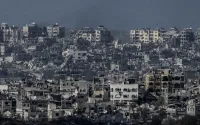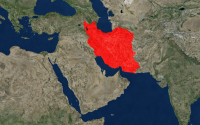24 December 2005Marcus Tanner in Banda Aceh
Adnan Ibrahim has a boat in his backyard. Or rather, he has a 100ft ship, several hundred tons of metal, sitting amid the wooden shacks of the Punge district of Banda Aceh and looking as if it was built there as an exhibit.
It was not. On 26 December last year, when the tsunami brought destruction on a biblical scale to Indonesia's remote Aceh province, killing 200,000, the floodwaters lifted the ship out of the ocean and deposited it two miles inland. The little wooden house where Mr Ibrahim's uncle used to live lies scrunched beneath it.
"I remember a strange light in the sky and the screaming of thousands of birds," Mr Ibrahim, a retired civil servant says, recalling the minutes before the vast wall of water, triggered by an undersea earthquake measuring 9.2 on the Richter scale, 80 miles away, smashed into Aceh's west coast. "I started running with my son but the water was 12 metres deep and we were floating. I remember my son shouting, 'There is a ship coming this way'. The water was full of snakes."
Like most of Aceh's four million people, Mr Ibrahim lost friends and family that Sunday, including a son and daughter. His other son survived, as did his uncle.
Yashir saw his whole family for the last time at 8am, as he and his young wife opened their motor-oil shop in Banda Aceh. Like most of the deeply religious Muslim Acehnese I met, he seemed reluctant to admit to feelings of anger over the loss. "It was the will of God," he says.
The flood in Aceh left half a million survivors homeless. A year on, Western aid agencies, many of them co-ordinated by the European Union's aid arm, Echo, Islamic Relief and the Indonesian government, have worked to heal this broken and violated land, aided by the world's generous response to their appeals.
But the scale of the task is monumental. The flood permanently altered the coastline, depositing giant salty lagoons far inland and rendering land where houses once stood impractical for rebuilding.
Echo's slogan, "Build back better", means roads and villages must be recreated in areas safe from another flood. But this is slow work, and the additional confusion over property rights means tens of thousands of people are still in tents.
Latifa, 49, counts herself lucky that her husband, a fisherman, and four children survived. Most other fishermen, already out in their boats that day, never came home. But her house by the sea vanished and she lives in a plastic and tarpaulin tent that offers poor shelter from the monsoon rains, wondering when - or if - an aid group will give her a new home. Her family of six does not even have the shapeless tent to themselves. "I have to share with my nieces," Latifa says. "They lost their parents."
The government gives homeless people a monthly allowance of a few pounds' worth of Indonesian rupees but with her husband's job as a fisherman gone, the couple's gaunt faces show how hard it is to make ends meet. "I'm still waiting to see if I get rehoused," she said. "I have no idea when. I'm afraid the aid projects will finish before I get a new home."
Yards from Latifa's muddy tent village, dozens of other homeless families live in a requisitioned wooden barracks. Latifa at least has her man. In Lhoknga, women sit on their haunches amid the ruins of their fishing village without a man in sight. Some husbands are in the nearby, neatly railed mass grave that houses a thousand or so bodies washed up on the shore.
Of the seven thousand people who lived and fished this coast, only hundreds survived. The women, in identical pine-green aid agency T-shirts, smile incongruously as they repeat terrible stories of husbands, parents, brothers and sisters and babies, all gone.
The aid groups are helping Aceh to recover, but whether anyone can help deal with the trauma caused by 200,000 deaths is another matter. Most victims, like Yashir, refuse to see themselves as such, referring instead to the will of God. You search in vain for the anger you can pin your sympathy on. What you get are terrible, blank, smiles.






